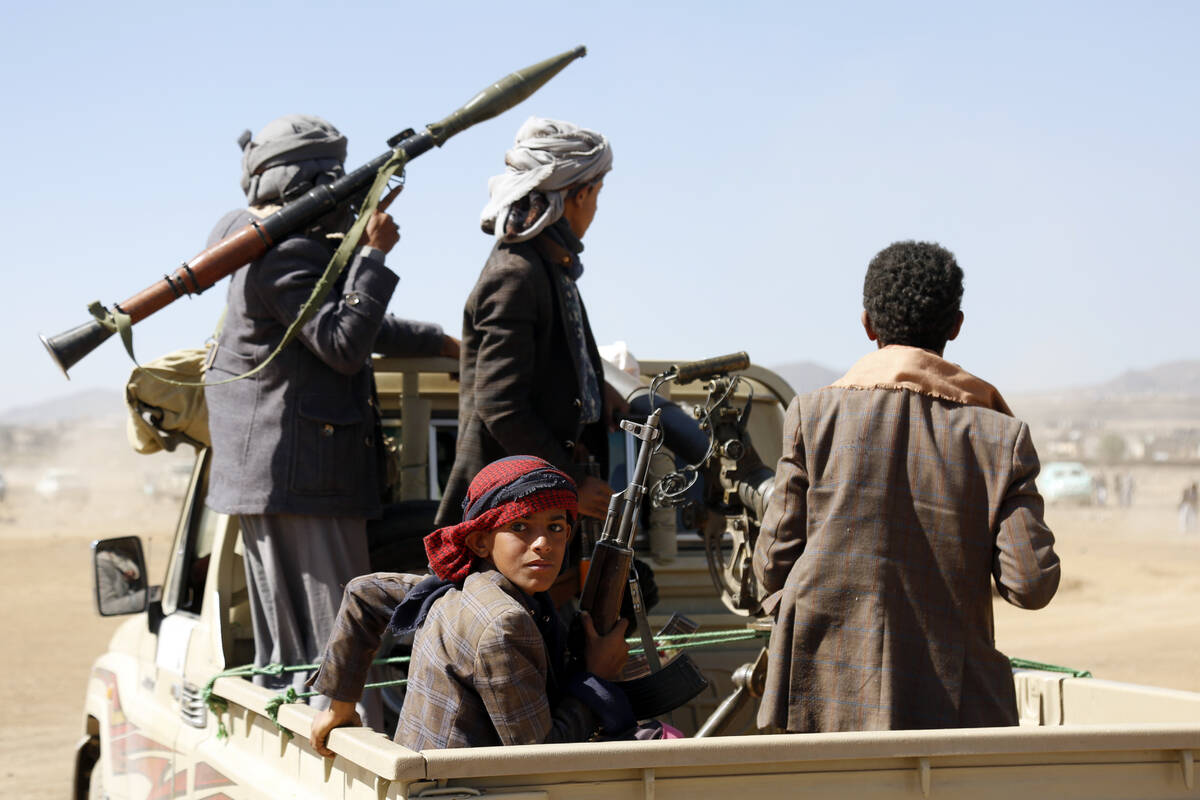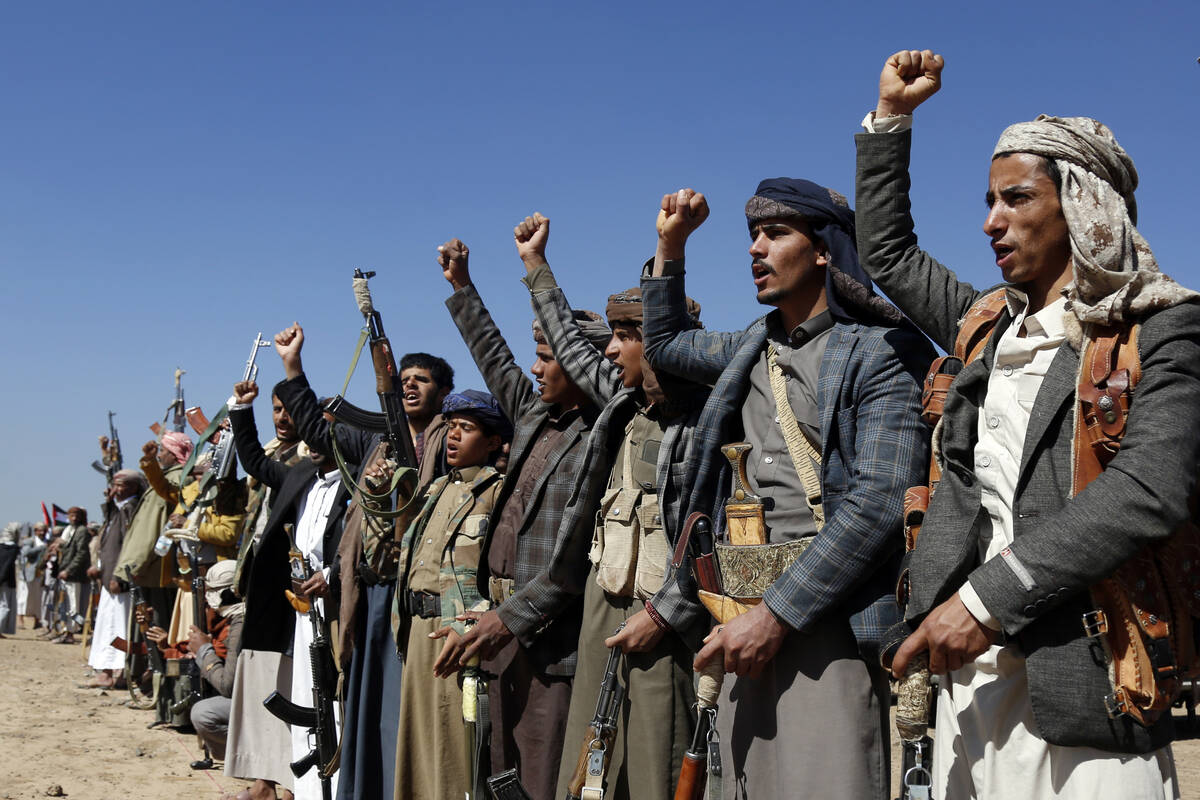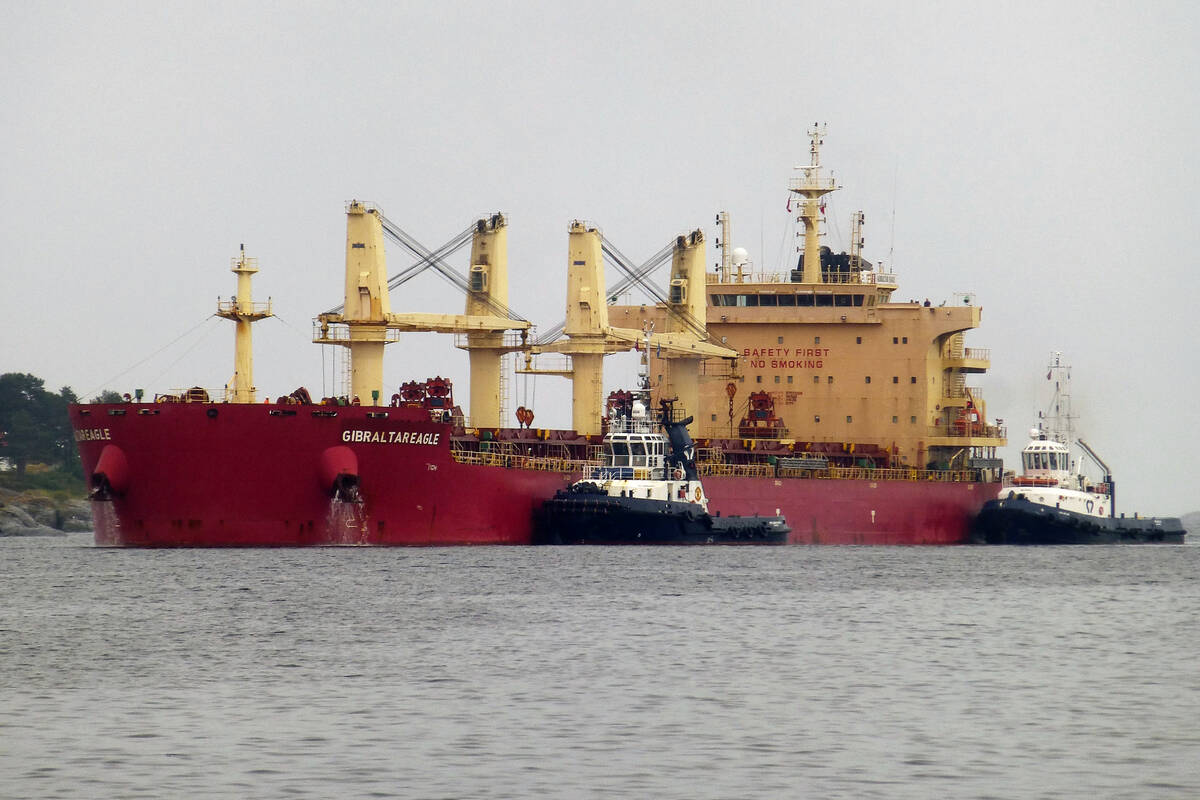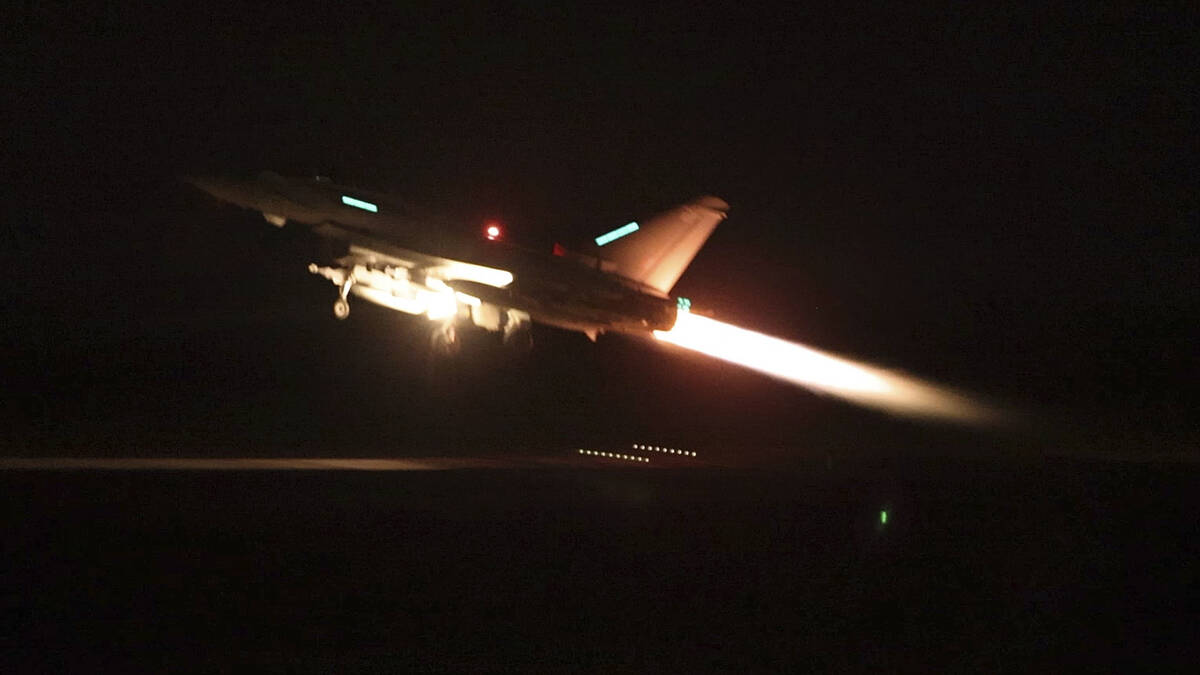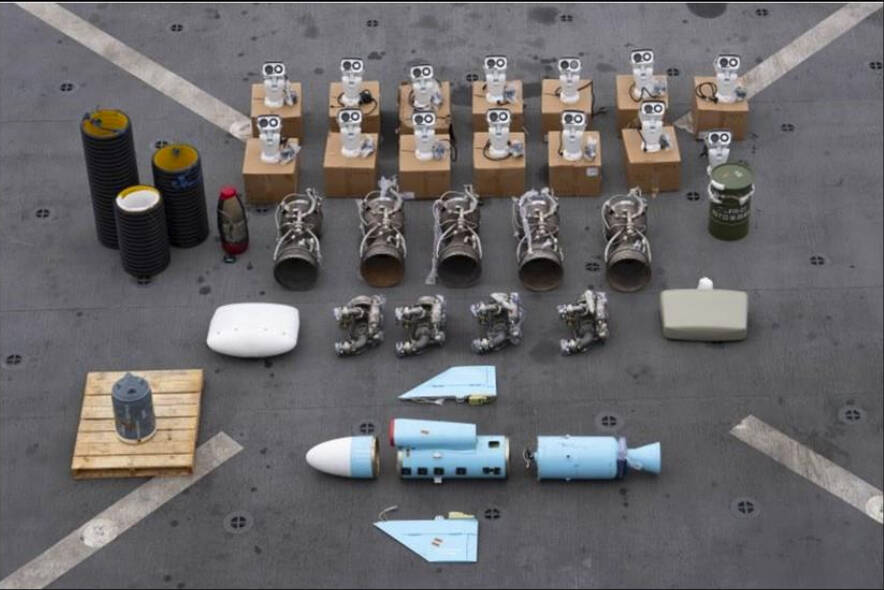U.S. military launches another barrage of missiles against Houthi sites in Yemen
WASHINGTON — The U.S. military fired another wave of ship- and submarine-launch missile strikes against Houthi-controlled sites Wednesday, multiple U.S. officials said, marking the fourth time in days it has directly targeted the group in Yemen as violence that ignited in the wake of the Israel-Hamas war continues to spill over in the Middle East.
The strikes were launched from the Red Sea and hit more than a dozen sites, the officials said.
The strikes followed an official announcement Wednesday that the U.S. has put the Houthis back on its list of specially designated global terrorists. The sanctions that come with the formal designation are meant to sever violent extremist groups from their sources of financing.
The officials spoke on the condition of anonymity to discuss details that have not been made public yet.
Despite the sanctions and military strikes, including a large-scale operation Friday carried out by U.S. and British warships and warplanes that hit more than 60 targets across Yemen, the Houthis are continuing their harassment campaign of commercial and military ships.
The latest incident occurred Wednesday when a one-way attack drone was launched from a Houthi-controlled area in Yemen and struck the Marshall Islands-flagged, U.S.-owned and -operated M/V Genco Picardy in the Gulf of Aden.
The U.S. has also strongly warned Iran to cease providing weapons to the Houthis. Iran has long vowed to destroy Israel.
On Thursday, a U.S. raid on a dhow intercepted ballistic missile parts the U.S. said Iran was shipping to Yemen. Two U.S. Navy SEALs remain unaccounted for after one was knocked off the vessel by a wave during the seizure and the second followed the overcome SEAL into the water.
On Wednesday, Pentagon press secretary Maj. Gen. Pat Ryder said the U.S. would continue to take military action to prevent further attacks.
“They are exploiting this situation to conduct attacks against the ships and vessels from more than 50 countries … around the world. And so we’re going to continue to work with our partners in the region to prevent those attacks or deter those attacks in the future,” Ryder said.
There have been several incidents since the Friday joint operations.
The Houthis fired an anti-ship cruise missile toward a U.S. Navy destroyer over the weekend, but the ship shot it down. The Houthis then struck a U.S.-owned ship in the Gulf of Aden on Monday and a Malta-flagged bulk carrier in the Red Sea on Tuesday.
In response Tuesday, the U.S. struck four anti-ship ballistic missiles that were prepared to launch and presented an imminent threat to merchant and U.S. Navy ships in the region.
Hours later, the Houthis claimed responsibility for the attack on the Malta-flagged bulk carrier Zografia. The ship was hit, but no one was injured and it continued on its way.
Sanctions designed to minimize harm
Biden administration officials said they would design the financial penalties on the Houthis to minimize harm to Yemen’s 32 million people, who are among the world’s poorest and hungriest after years of war between the Iran-backed Houthis and a Saudi-led coalition.
The sanctions that come with the formal designation are meant to sever violent extremist groups from their sources of financing.
President Donald Trump’s administration designated the Houthis as global terrorists and a foreign terrorist organization in one of his last acts in office. President Joe Biden reversed course early on, at the time citing the humanitarian threat that the sanctions posed to ordinary Yemenis.
Conservatives have pressed for the foreign terrorist designation to be reimposed ever since the Biden administration lifted it.
Republican Rep, Michel McCaul of Texas, chairman of the House Foreign Affairs Committee, cited the series of Houthi attacks as he condemned the White House’s decision not to reimpose that tougher designation, which carries more sweeping penalties.
When Biden was asked last week whether the Houthis were a terrorist group, he replied, “I think they are.”
Houthis part of a network
The Houthis are one in a network of Iran- and Hamas-allied terrorist groups around the Middle East that have escalated attacks on Israel, the U.S. and others since Israel’s military offensive in Gaza, in response to the Oct. 7 Hamas terrorist attacks in Israel.
The Houthis were originally a clan-based rebel movement. They seized Yemen’s capital in 2014 and withstood a subsequent yearslong invasion led by Saudi Arabia aimed at driving the Houthis from power. Two-thirds of Yemen’s people live in territory now controlled by the Houthis.
Even as administration officials previewed the new sanctions, Houthis launched the second attack this week against an American-owned ship, striking with a bomb-carrying drone. The vessel and crew were safe after extinguishing a fire from the attack, the captain reported.
Houthi spokesperson Mohammed Abdul-Salam, meanwhile, said in a post on X, formerly Twitter, that the terrorist group considered its new terrorist designation by the U.S. to be “a badge of honor for Yemen for its support of Palestinian resistance in Gaza.”
Critics say the additional broad U.S. sanctions may have little effect on the Houthis, a defiant and relatively isolated group with few known assets in the U.S. to be threatened. There is also concern that designating the Houthis as terrorists may complicate international attempts to broker a peace deal in the now-subsided war with Saudi Arabia.
Also, aid officials expressed concern. The decision would only add “another level of uncertainty and threat for Yemenis still caught in one of the world’s largest humanitarian crises,” Oxfam America associate director Scott Paul said.
War and chronic misgovernment have left 24 million Yemenis at risk of hunger and disease, and roughly 14 million are in acute need of humanitarian assistance, the United Nations says. Aid groups during the height of Yemen’s war issued repeated warnings that millions of Yemenis were on the brink of famine.
Aid organizations worry that just the fear of running afoul of U.S. regulations could be enough to scare away shippers, banks and others in the commercial supply chain that Yemenis depend upon for survival. Yemen imports 90 percent of its food.
U.S. officials said the sanctions would exempt commercial shipments of food, medicine and fuel, and humanitarian assistance into Yemeni ports. The U.S. will wait 30 days to put the sanctions into effect, officials said, giving shipping companies, banks, insurers and others time to prepare.
‘Unprecedented’ exemptions
Biden’s national security adviser, Jake Sullivan, said in a statement that the U.S. would roll out “unprecedented” exemptions in the sanctions for staples including food to “help prevent adverse impacts on the Yemeni people,” adding that they “should not pay the price for the actions of the Houthis.”
The administration, for now, is not reimposing the more severe designation of foreign terrorist organization on the Houthis. That would have barred Americans, along with people and organizations subject to U.S. jurisdiction, from providing “material support” to the Houthis. Aid groups said that step could have the effect of criminalizing ordinary trade and assistance to Yemenis.
The U.S will re-evaluate the designation if the Houthis comply, Sullivan said.
Jared Rowell, the Yemen country director for the International Rescue Committee, said last week that the attacks and counterattacks already were interrupting the delivery of goods and aid into Yemen, delaying shipments of vital commodities and raising prices for food and fuel. Hisham Al-Omeisy, a Yemeni analyst living in the Washington, area, said the U.S. designation plays into the Houthis’ narrative to the world that they are standing up to a superpower to champion Muslims everywhere.
At home, the designation helps the Houthis’ message to Yemenis that the U.S. is the cause of their suffering, Al-Omeisy said.
In the past, he said, the Houthis were angered that “the U.S. was basically treating them as a bug on the windshield.”
Now, “they’re like, ‘You know what, they respect us,’” he said of the Houthis’ attitude. “‘Yeah, we can go toe to toe with the Americans, right?’”
It’s not clear if any U.S. partners are working on similar sanctions.
European Commission spokesman Peter Stano declined to comment on whether sanctions are being discussed.
———
Associated Press writer Lorne Cook in Brussels contributed to this report.



